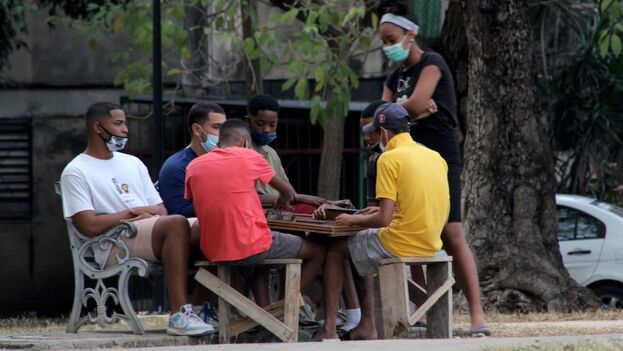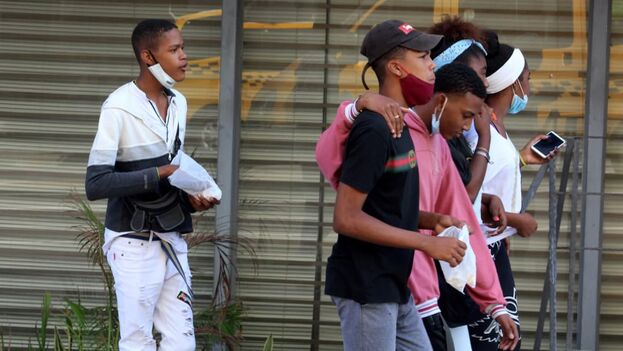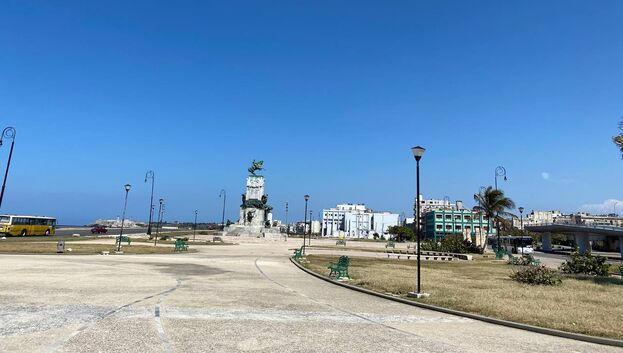
![]() 14ymedio, Luz Escobar, Havana, 22 March 2021 — Alicia Quevedo’s dream was to turn 18 so that she could go out with her friends at night, stay over at her boyfriend’s house and be allowed to spend a weekend at the beach. On January 11th, the expected day arrived, but two months later, she has not yet been able to fulfill a single one of her three wishes. Her mother and her grandmother insist that she stay home and avoid unnecessary visits.
14ymedio, Luz Escobar, Havana, 22 March 2021 — Alicia Quevedo’s dream was to turn 18 so that she could go out with her friends at night, stay over at her boyfriend’s house and be allowed to spend a weekend at the beach. On January 11th, the expected day arrived, but two months later, she has not yet been able to fulfill a single one of her three wishes. Her mother and her grandmother insist that she stay home and avoid unnecessary visits.
“The challenge of having adolescents confined for the year this coronavirus crisis has lasted has been very tough. Young children are harder to take care of, physically, it is true, but teenagers do not like to be under the family’s radar 24/7, they get very rebellious and anxious”, says the mother. “Sometimes I relent and allow her the occasional short visit, but most of the time she is at home without being able to see her friends or go out with them”, she adds.
And of course, that is what Alicia wants the most, she’s dying to see her friends. “My mother spends the day watching what I do, watching that I don’t smoke, don’t listen to that music or do not talk to a certain friend whom she dislikes. In normal times she would not even know what I do, but of course, now we are together all the time and she does not take her eyes off me”, she laments.
“In normal times she would not even know what I do, but of course, now we are together all the time and she does not take her eyes off me”
In general, parents of adolescents find it difficult to explain the dangers posed by COVID because they feel invincible.
“My daughter watches the news and knows perfectly, according to the data, that her age range is not the most problematic and that makes it very difficult for me to convince her to stay home, I have to get tough. I even talked to a psychologist but she told me that it is normal, that at that age it is a problem to make them follow the current measures because they want to see their friends and be able to go out and in no way understand to what extent social distancing helps them keep them away from contagion”, she explained.
According to this mother, the specialist recommended that she speak clearly to the young woman and tell her that the problem is not in them, that the important thing is to make them see that they could be asymptomatic carriers and infect others. “I tell her, look, you can’t know if your friends are well or sick, and if you catch it, nothing will happen to you, but if your 76-year-old grandmother gets sick she could die, that’s how hard it is. I spoke to her that sternly but she still complains”.
It is a consensus among psychologists that, for adolescents and young people, being with friends is the most important thing in their lives. One of these specialists who spoke to 14ymedio – asking to remain anonymous to avoid problems at her workplace – commented that one has to “have a talk with the kids” and listen to what they are feeling in order to “try to understand them”, and for them so see that the family understands how frustrating the isolation is for them.

“From time to time you can be flexible in some of the measures. Letting them talk on the phone and spend time on social networks can help fill that void in socialization that they are living through right now. One has to find ways to motivate them at home, with family board games, watching a movie or a series together, activities that involve everyone”, she recommended.
The mother complains that there are things that do not help, because “not all parents take the measures seriously” and that makes it difficult to make her daughter see the severity of the problem. “There are some parents who are not complying with all the established measures, and allow their kids to be out on the street all day. So, what can I say to my daughter when she looks out the window and sees one of her friends playing dominoes in the park or sitting on the benches talking?”
She also says that her daughter is very distressed because she is “missing out on things: she missed her best friend’s 15th birthday party, her theater workshop graduation, and her boyfriend’s birthday party. But I can’t risk her being where there are so many people because I have to care for my mother. Besides, the last thing I want right now is to have any of the family hospitalized”.
A survey conducted by UNICEF at the end of last year shows that the COVID-19 crisis has had “a significant impact” on the mental health of young people in Latin America and the Caribbean
A survey conducted by UNICEF at the end of last year shows that the COVID-19 crisis has had “a significant impact” on the mental health of young people in Latin America and the Caribbean. The study collected the comments of 8,444 adolescents and young people between the ages of 13 and 29 in nine countries in the region and broke down feelings they had to face during the first months of the pandemic, specifically in September.
Some 27% of the participants said they felt anxiety and 15% were depressed in the last seven days, while 46% reported having less motivation to do “activities that they normally enjoyed”. According to the study, young people’s perception of the future has also been negatively affected.
However, other adolescents have looked for better ways to pass the time and, within the pandemic, they have found motivations. Jennifer de la Vega is now finishing twelfth grade, but according to her grandmother “she is helping high school boys” who live in the building with reviews of the subject where she considers herself “a specialist”, and where many of her neighbors “are lazy”: mathematics.
“I go to their houses and help them solve the tele-classes exercises. I also explain the new content. It is a bit like playing teacher, something that I liked to do a lot when I was little, but now my students are not stuffed animal puppets, but friends from the building,” says the girl who confesses that her friends at school made fun of her for being “always on time” and always studying.
“I also like to read a lot. I have downloaded several books on the phone and spend hours on it. I also want this to be over, but I am taking advantage of my free time in productive things to avoid going crazy thinking about what I am missing. Like many, the arrival of the coronavirus has changed our routines and I have tried to make it better, not only for myself, but also for those around me”, says Jennifer.

The parks where young people usually gather in Havana are empty. Maceo Park, which normally welcomes young soccer fans, looked deserted this Friday afternoon. The same panorama was seen in the Parque de los Mártires, in Infanta and San Lázaro, and also at the intersection of Línea and L Streets, in the El Vedado neighborhood. Despite the disappointment, most of the young people are at home, waiting for the nightmare to end.
____________
COLLABORATE WITH OUR WORK: The 14ymedio team is committed to practicing serious journalism that reflects Cuba’s reality in all its depth. Thank you for joining us on this long journey. We invite you to continue supporting us by becoming a member of 14ymedio now. Together we can continue transforming journalism in Cuba.
